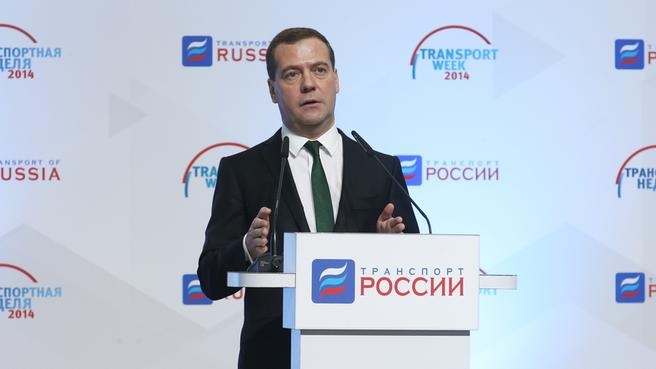Dmitry Medvedev: “Transport is very important in every country and for us it is simply the nerve centre of the economy. Without roads, you can’t have a unified country, and the transport industry continues to work steadily even in the current difficult economic conditions. This is very important for an enormous number of people, for the entire country in fact.”
The “Transport of Russia”
international forum and exhibition have been held by the Russian Transport
Ministry since 2007. Every year the key event of the transport industry is attended
by over 2,000 participants from Russia
and 25 countries of the near and far abroad.
Excerpt from Dmitry Medvedev’s speech at the plenary session, Transport Infrastructure: Accelerated Development Strategy
This forum is a good venue for discussing the main areas of development of all modes of our transport, road facilities, and bottlenecks, for reviewing our performance and mapping out plans for the future.
Transport is very important in every country and for us it is simply the nerve centre of the economy. Without roads, you can’t have a unified country, and the transport industry continues to work steadily even in the current difficult economic conditions.
Transport workers have the right to be proud for many achievements. I’ll cite just one example – the Olympic and Paralympic Games. Their contribution to the success there was substantial. New roads and tunnels were built in Sochi. When you see them, you feel proud that we are capable of such things. In the past we thought we couldn’t build them on our own. Now we know we can, and fairly quickly at that. We should use the experience that we gained in Sochi and to some extent in Vladivostok prior to Sochi, not only to develop the transport networks of our cities, but as we complete infrastructure projects for the FIFA World Cup, the Winter Student Games in Krasnoyarsk and other major international competitions. They will all require transport and we must build the necessary infrastructure.
This year the transport complex has met its goals, but the plans for the next year are no less ambitious. Last summer the Government approved changes in the transport strategy. It is essential to upgrade the quality of services, competitiveness of the industry, corporate management and transparency, reduce overheads, and enhance the innovation, social and eco-friendly aspects of the industry.
In 2015, the Ministry of Transport should further step up its work in this area, with an emphasis on the motorway network. In his annual address the President emphasised the need to double the construction of motorways. This is a difficult task. We discussed this with the President before and all experts said that this is a feasible goal.
We must increase the capacity of sea ports and continue to build up their infrastructure. I’m referring to the ports of Vanino, Olya and Sabetta, to name a few.
The plans provide for the modernisation of the Baikal-Amur and Trans-Siberian railways. These are grandiose projects as well. In October the Government endorsed details of the investment project to upgrade the Baikal-Amur and Trans-Siberian railways and boost their capacity next year. The Government will start allocating funds for this purpose before the end of the year, partially from the National Wealth Fund.
We must continue developing regional flight connections and building more airports. Many airports – in Volgograd, Ufa and Vladikavkaz, to name a few – require reconstruction.
It would be remiss not to mention this year’s important historical acquisition – the return of Crimea. We must rapidly develop stable transport service there. Some steps have already been taken. The number of fights has increased considerably; a railway bypassing the neighbouring country is functioning; and ferries are in operation. Next year we must finish the design and start the construction of the bridge over the Kerch Strait. This is a very ambitious and complicated task, but we must do everything to eliminate long ferry queues and, more importantly, to make Crimea feel like it’s part of a big and powerful country. Considerable funds have been allocated for this purpose.
I hope that next year you’ll meet at this venue again.
On behalf of the Government and myself
personally, I’d like to thank you for your work in the transport complex, for
all you have been doing in this regard.
<…>












